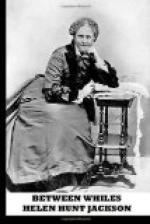Jeanne had come breathless to her room, crying, “Victorine! Victorine! That son of my husband’s of whom we were talking, young Willan Blaycke, is at the door,—he, and an old man with him; and they must perforce stay here all night. Now, it would be a shame I could in no wise bear to stand and serve him at supper. Wilt thou not do it in my stead? there are but the two.” And the wily Jeanne pretended to be greatly distressed, as she sank into a chair and went on: “In truth, I do not believe I can look on his face at all. I will keep my room till he have gone his way,—the villain, the upstart, that I may thank for all my trouble! Oh, it brings it all back again, to see his face!” And Jeanne actually brought a tear or two into her wily eyes.
The no less wily Victorine tossed her head and replied: “Indeed, then, and the waiting on him is no more to my liking than to thine own, Aunt Jeanne! I did greatly desire to see his face, to see what manner of man he could be that would turn his father’s widow out of her house; but I think Benoit may hand the gentleman his wine, not I.” And Victorine sauntered saucily to the window and looked out.
“A plague on all their tempers!” thought Jeanne, impatiently. Her plans seemed to be thwarted when she least expected it. For a few moments she was silent, revolving in her mind the wisdom of taking Victorine into her counsels, and confiding to her the motive she had for wishing her to be seen by Willan Blaycke. But she dreaded lest this might defeat her object by making the girl self-conscious. Jeanne was perplexed; and in her perplexity her face took on an expression as if she were grieved. Victorine, who was much dismayed by her aunt’s seeming acquiescence in her refusal to serve the supper, exclaimed now,—
“Nay, nay, Aunt Jeanne, do not look grieved. I will indeed go down and serve the supper, if thou takest it so to heart. The man is nothing to me, that I need fear to see him.”
“Thou art a good girl,” replied Jeanne, much relieved, and little dreaming how she had been gulled by Mademoiselle Victorine,—“thou art a good girl, and thou shalt have my lavender-colored paduasoy gown if thou wilt lay thyself out to see that all is at its best, both in the bedrooms and for the supper. I would have Willan Blaycke perceive that one may live as well outside of his house as in it. And, Victorine,” she added, with an attempt at indifference in her tone, “wear thy white gown thou hadst on last Sunday. It pleased me better than any gown thou hast worn this year,—that, and thy black silk apron with the red lace; they become thee.”




